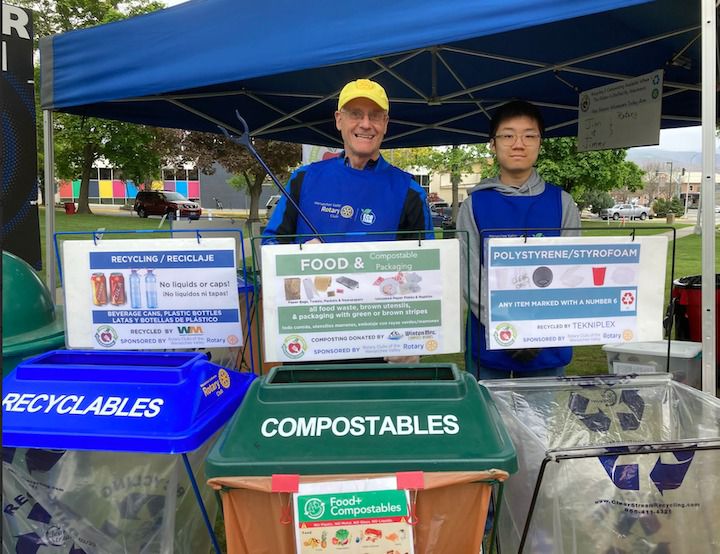By Kris Cameron, ESRAG Plant-Rich Diet Task Force, Amelie Catheline, ESRAG Food Waste Task Force, and Tami Mulcahy, ESRAG Plastic Solutions Task Force
Towards Zero-Waste events

Alert at the Apple Blossom
Festival Beer Garden, volunteers Brian
Brennan and Selina Danko fished out
items that needed to go to a different
receptacle.
No matter what you call it – near zero waste, towards zero waste, or something else – any club can help reduce GHG emissions and conserve natural resources by focusing on waste at their own or other events.
Inspired by the Poulsbo, Washington Rotary Club’s successful efforts to reduce waste at their Viking Tour bike event from a 4-cubic yard dumpster to one garbage bag of trash, and the ESRAG Green Events Handbook, the Wenatchee Confluence Rotary Club and a few members from other clubs, decided to attempt the same at the local 11-day Washington State Apple Blossom Festival.
Towards Zero Waste (TZW) compost and recycling stations were located throughout the park, local businesses sponsored compostable cups in the beer garden and empty wine bottles were recycled with Chelan Rotary’s 911 Glass Rescue. All cardboard was recycled and vendors were provided with buckets to collect their kitchen waste for composting. Local commercial composter Winton Mfg. donated compostable service items to interested vendors, as well as their hauling and processing services.
Partner organization Sustainable NCW inaugurated a Green Vendor Award to recognize and reward sustainable practices among the 26 food vendors. An annual luncheon, affiliated with the Festival, offered a plant-based/low-carbon entree option as well. Rotary and Interact members made up half of the 108 community volunteers who helped reduce landfill waste by almost 40% (six tons) by weight. You can watch a local feature story here.
Inspiring Event Success Stories and Practical Tips for Clubs

Community Reusable Dinner Kit
The Solana Beach Eco Rotary Club near San Diego also supports events in their effort to reduce waste. The Club started in 2009 to make the Annual Encinitas Wine & Food Festival as close to zero waste as possible, providing planning support and volunteers to sort out organics, and recyclables, and collect reusable utensils. The Club has since then created a Zero Waste Committee to strengthen its efforts and now provides a Community Reusable Dinnerware Kit for anyone who organizes an event in the community. One of the major achievements was replacing the disposable dishware with reusables at the 2022 EcoFest Encinitas and providing a washing station onsite.
The event welcomed 1000+ visitors, and two food vendors and generated only 5 lbs of trash, while 19 lbs went to the recycling path, and 27 lbs of organics were collected. As part of the zero waste effort, the club provided around 150 plates and silverware sets to the two food trucks. There was a washing station to clean and reuse them all day long. No single-use items were used, so no addition to the trash.
For more information and examples about ways your club can provide waste reduction and diversion services at events, contact Kris at [email protected], Amelie at [email protected], or Tami at [email protected].
Before you get started, here are some resources and questions to guide your planning:
Event – Are the coordinators of the event supportive and in agreement about your efforts? Are they willing to devote staff and/or financial resources to the effort? Are they willing to make your project an official part of the event and promote it as such?
Waste Haulers – Do you have access to a commercial composting facility? Do you have a local recycler? Are they willing to collect and/or donate their collection and hauling services for the items you collect? Will you need to transport these materials after the event?
Food and Beverage Vendors – Can they be required to use only compostable and recyclable packaging? If not, what kind of support can you offer them to incentivize the use of these items? Lower event fees? Subsidized prices? Local supply sources or on-site delivery? Make sure you know what types of items can be processed in your local facilities – they are not all the same. Is it possible to donate excess food after the event?
Equipment – ClearStream systems have several advantages. There are a variety of systems you can use, such as cardboard collection containers, labelled buckets on tables, etc. Some waste hauliers can provide receptacles.
Volunteers -. To make sure your waste diversion efforts are successful, stations must be staffed. It’s more fun to work in pairs and often other organizations are glad to help. Provide training and support. How-to videos and talking points are helpful. Decide what kind of sign-up system you will use, and text reminders and thank-you messages are welcomed.
Collection Station Configuration – How many stations will you have? Where will they be located? (Entrances, exits, and busy areas are ideal.) How will you guide patrons to them – sandwich boards? Flags? Maps? Specially marked tents? It’s helpful to remove or disable stand-alone garbage cans while your stations are staffed.
Kris Cameron, Co-Chair of ESRAG’s Plant-Rich Diet Task Force, is a member of the Wenatchee Confluence Rotary Club, Washington State, USA. Amélie Catheline chairs ESRAG’s Food Waste Solutions Task Force, and is a member of the Solano Beach Rotary Club, California, USA. Tami Mulcahy is the Chair of ESRAG’S Plastic Solutions Task Force and belongs to Los Altos Rotary Club in California.

